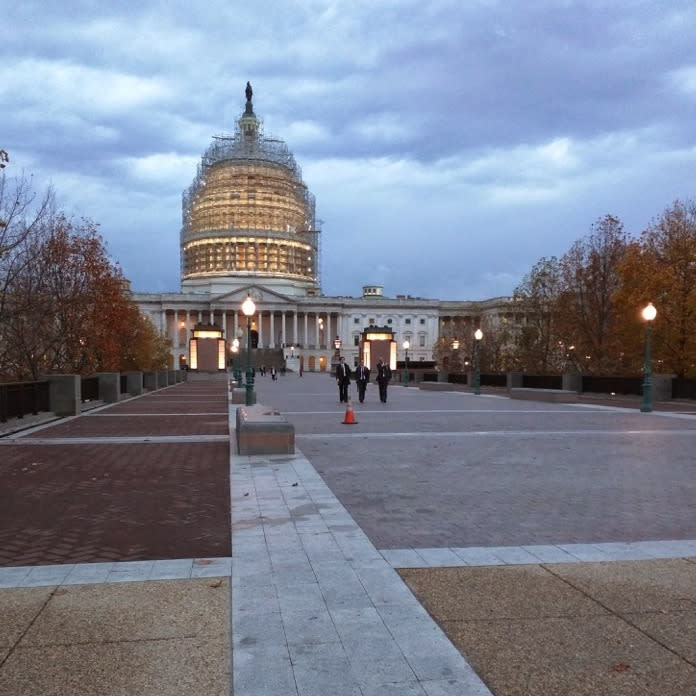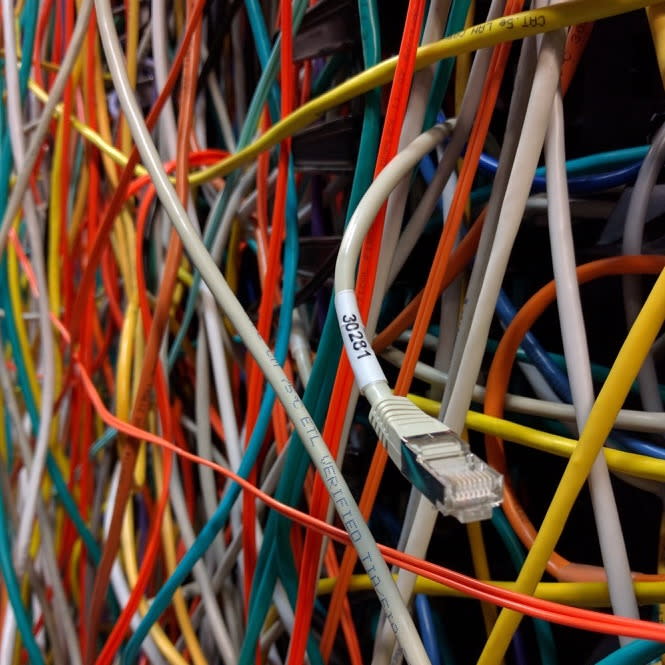The Telecommunications Act at 20: How Congress Almost Managed to Predict the Future of the Net

(Images by Rob Pegoraro/Yahoo Tech)
Twenty years ago, Congress completed an exercise that now seems impossible: a comprehensive rewrite of the telecom laws governing everything from the cables in the ground to the signals in the air, all so that we, the people, might have more and better choices.
Here’s the curious thing: Congress didn’t totally blow it, despite having little experience in the Internet and some priorities that today seem laughably misplaced. No such chance has come up since; today, it’s the Telecommunications Act of 1996’s world, and we just log on in it.
Here’s how the 46,000-plus words that President Clinton signed into law two decades ago on Monday—and the subsequent series of Federal Communications Commission rules mandated by them—have worked out in a few key areas.
Competition worked… for phone calls
The authors of Telecom Act wanted this law to liberate you from the same old phone and cable companies. In an interview Friday, Rick Boucher, the former Virginia congressman who helped write the Act, said: “We deliberately opened the door to competition in telecommunications markets that for the most part had been monopolies.”
The Act let your cable company sell phone service, freed your phone company to bring you TV channels, and set up both to offer Internet service. But only the phone part has unquestionably worked.
“We got a lot of competition in the traditional voice service,” says Harold Feld, a vice president at the digital-rights group Public Knowledge. “Number portability, for example, was the classic example of the way you could have a regulation that promotes competition.”
Video and Internet? Not so much
Internet access got off to a promising start with a flourishing of phone-based digital subscriber line (DSL) services, many from newcomers renting the facilities of local phone companies. The Act, however, left much of the terms of this wholesaled access up to the Federal Communications Commission—and after 2001, George W. Bush’s FCC soured on DSL “line-sharing.”
“Elections do have consequences, and that might have been one of them,” says Boucher, today an attorney with the Sidley Austin law firm and honorary chair of the generally pro-industry Internet Innovation Alliance.
Boucher doesn’t think forcing telecoms to share their facilities with competitors was sustainable anyway. Feld wishes it had been kept in place and applied to cable too.
Either way, across many regional phone companies, DSL fell behind cable speeds and never got fast enough to deliver TV. That’s left cable in charge. Observed Boucher: “I don’t think we could have foreseen that the cable industry would become as successful as it has.”
The Act did, however, yield one pay-TV alternative—it put us on the road to the digital-TV transition that gave many cord cutters free over-the-air high-definition TV for the price of a cheap antenna.

Do read the comments
For those of you itching to post a comment on this story, the most important part of the Act was the bit, known as Section 230, that ensured sites could not be sued into oblivion for things their users shared there.
“Section 230 […] made Facebook and Twitter possible,” wrote Berin Szoka, president of the libertarian-minded TechFreedom. “Without 230, such platforms would have been held liable for the speech of their users.”
Mike Masnick, publisher of the policy blog Techdirt, called section 230 “the most important law on the Internet” in a post last week. As he wrote there, it was also a late addition to a branch of the Telecom Act dominated by a sweeping criminalization of obscene or indecent online material.
Fortunately, the Supreme Court threw out that part in 1997, leaving section 230 intact. And so the part of the Act that was meant to ban porn online instead has protected it, along with every single site that hosts stuff we upload: not just Facebook and Twitter, but every online forum and every comments thread.
(I realize that last bit may not read as much of a compliment.)
At the time, the Act also got a lot of attention for requiring the parental-control “V-chip” in TVs—this content-filtering feature got a mention at the start of President Clinton’s signing statement. Have you used that lately? No, me neither.
Media consolidation and privacy: Missed opportunities
The foresight of the Act’s authors also failed them when they set out to loosen ownership rules for TV and radio.
“Media concentration was a total bust,” said Feld of its effects on our culture and the broader market. The consolidation of media companies gave us fewer choices and higher fees, as soundalike radio dominates traditional airwaves (though not Internet radio or, for a lucky few, low-power FM). This also led to the problem of a small number of giant TV companies demanding ever-higher retransmission fees from cable and satellite operators, who in turn pass on the cost to subscribers, Feld argues.
The Act also had next to nothing to say about telecom privacy, and we’ve been muddling through ever since in such areas as ad targeting, bulk surveillance, and encryption. That’s one of the things Boucher would like to see fixed in a successor bill.
“I think we should adopt a privacy right for the data of Internet users,” he said at a press breakfast Tuesday morning in Washington. Also on his list: pushing phone companies to retire old copper wires in favor of fiber and adding “strong network neutrality protections.”
But a single look at the net-neutrality debate, in which the FCC’s so-far meek oversight has been portrayed as Communist censorship, should make it clear how far we are from the days of 1996.
Email Rob at rob@robpegoraro.com; follow him on Twitter at @robpegoraro.
